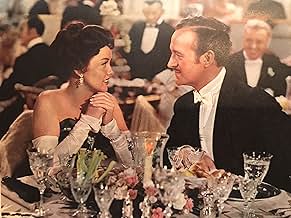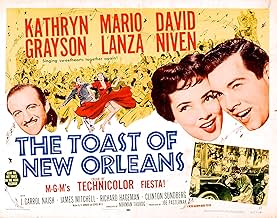Füge eine Handlung in deiner Sprache hinzuA snooty opera singer meets a rough-and-tumble fisherman in the Louisiana bayous, but this fisherman can sing. Her agent lures him away to New Orleans to teach him how to sing opera, but com... Alles lesenA snooty opera singer meets a rough-and-tumble fisherman in the Louisiana bayous, but this fisherman can sing. Her agent lures him away to New Orleans to teach him how to sing opera, but comes to regret this rash decision when the singers fall in love.A snooty opera singer meets a rough-and-tumble fisherman in the Louisiana bayous, but this fisherman can sing. Her agent lures him away to New Orleans to teach him how to sing opera, but comes to regret this rash decision when the singers fall in love.
- Für 1 Oscar nominiert
- 1 Nominierung insgesamt
- Bar Patron
- (Nicht genannt)
- Fisherman
- (Nicht genannt)
- Dowager
- (Nicht genannt)
- Restaurant Patron
- (Nicht genannt)
- Dominiques' Orchestra Leader
- (Nicht genannt)
- Dancing Villager
- (Nicht genannt)
- Bit Part
- (Nicht genannt)
- Fisherman
- (Nicht genannt)
Empfohlene Bewertungen
Yes, the plot is silly. But it shows how Lanza could be presented to show off his most attractive qualities. Though he is already verging on the portly in some of the scenes, and though he is more or less handsome depending on the angle from which he is photographed, the fact remains that he comes across as a generally handsome guy with a lot of very powerful virility. That's not something to be dismissed lightly.
There are lots of examples of that in the movie, but perhaps the most obvious, if also, in certain respects, the most troubling one, is the last scene, the performance of the love duet that closes Act I of Madama Butterfly. You have to forget that, in the opera, Butterfly is only 15, otherwise this comes across as very uncomfortable to watch. Grayson certainly doesn't look 15, though, so what we have is a young naval officer who is clearly very "eager" (you know the word) to get his new "wife" into bed, and who quickly subdues any efforts on her part to delay the wedding night. Modern productions of the opera make Pinkerton more nuanced, and have to. Here, the officer knows what he wants, and he's not going to take no for an answer, or wait for Butterfly to come around by charming her. It's a very powerful performance. Not, perhaps, the most faithful to the libretto, but completely convincing. Lanza conveys an animal magnetism that is very powerful.
The other aspect of Lanza that comes across very well is his singing of popular music. He really gets into it, and he can sing it in a very natural and appealing fashion. Nothing makes this clearer than the first time he sings "Be my love" with Grayson. She starts out, and she is NOT good. Yes, the notes are fine. But she c-a-r-e-f-u-l-l-y e-n-u-n-c-i-a-t-e-s every syllable, and it sounds completely unnatural, like an opera singer trying to sing pop but with no idea how to do so. Then Lanza joins her, and you hear the difference. He enunciates clearly, but the words sound completely natural. It's no wonder he was able to turn that into a major hit. What it shows is what MGM executives evidently did not understand: Lanza had a magic when doing popular music. Later efforts to get him to do 1920s American operettas, like the Student Prince, which were far more formal, took him out of what he could do very well.
You see this in the several opera excerpts Lanza sings. He's formal and stilted in the Flower Song from Carmen, where he is clearly working on getting the French right, and he sings it all at one volume level, which makes it much less interesting than other tenors' performances. When he sings O Paradiso (in Italian) from L'Africaine et M'appari (again in Italian translation) from Marta he is much more at ease. And he is downright first-rate in the Butterfly duet (in the original Italian, of course), where it is very obvious that he knows just what every word means, and means them.
I don't have anything to add about the rest of the movie. Grayson is no favorite of mine. She's alright in the canary fluff that was still done in those days - O luce di quest'anima, from Linda di Chamounix, Je suis Titania, from Mignon, Ombre légère, from Dinorah. She's much less right in the excerpt from Lucia, and not at all my cup of tea in Butterfly. She sounds as if she grew up listening to Lily Pons recordings, but she's not as good.
MGM should have paid closer attention to what did and did not work in this movie, and given Lanza movies that played off his strengths and avoided what he did less well.
Lanza is in fine form as a crude, loud, uneducated man who, in order to fit into New Orleans society and the opera world, has to learn manners, as well as how to dance and dress. A natural actor, he makes his complete transformation believable. He sings Jose's aria from "Carmen" beautifully, and this film introduces his hit, "Be My Love" to audiences, which he sings with Grayson. With the diminutive soprano, he also does "Libiamo" from "La Traviata." In the days in which this story is set, a singer like Grayson would have sung "Traviata," though audiences aren't used to hearing a fluttery coloratura sing it any longer. The two perform the love duet from "Madama Butterfly" as well - an absolutely horrid choice for Grayson, calling for a much weightier voice. Obviously the repertoire was chosen with Lanza in mind. Had MGM not used "Lucia" in "That Midnight Kiss," they could have perhaps used it here. Grayson gets to use her high extension in "Je suis Titania," but the rest of the aria suffers from pitch difficulties.
Lanza really helped to commercialize opera in the United States, but he did it without the help of MGM. Is it necessary for Niven to give the wrong explanation for the duet "La ci darem la mano?" And why, during the Butterfly duet, which is total foreplay, does Grayson constantly try to get away from Lanza? No matter her personal feelings, she was on stage playing a role.
Grayson looks lovely in an assortment of magnificent gowns and hats, and if her voice doesn't match Lanza's, it doesn't mean she could not have sung opera, which is often the criticism. There is definitely a place for coloratura sopranos in the opera world - just not singing with spinto tenors.
J. Carrol Naish plays an embarrassing, annoying stereotype as Uncle Nicky; Niven is wonderful, if underused, and his perfect voice and smooth manners are in great juxtaposition to Lanza's bumbling Pepe. James Mitchell, known to soap opera audiences now as Palmer Courtland on "All My Children" has a good featured part as a friend of Pepe's from the bayou, and he and a very young Rita Moreno, who's in love with Pepe, do a spirited dance number.
Lanza's reign at MGM was disappointingly short, and yo-yo dieting and drinking would claim his life nine years after this film. But what years, in which he gifted the world with his fresh, passionate, Italianate sound and thrilled millions of people all over the world.
Wusstest du schon
- WissenswertesAlthough they had previously appeared together in That Midnight Kiss (1949), Kathryn Grayson and Mario Lanza did not get along while making this film. While shooting the love duet scene from "Madame Butterfly," Grayson recalled that Lanza kept trying to French kiss her, which was made even more unpleasant by the fact that he kept eating garlic before shooting. To counter this, Grayson had costume designer Helen Rose sew pieces of brass inside her glove. Each time Lanza attempted to French kiss her, Grayson would smack him in the face with her brass-loaded glove. One of these smacks was included in the movie.
- PatzerThree-quarters of the way through the "Tina-Lina," Pierre's trousers develop a tear at the seam near the hip, which magically repairs itself in the next shot.
- VerbindungenFeatured in Das gibt's nie wieder (1974)
Top-Auswahl
Details
- Erscheinungsdatum
- Herkunftsland
- Sprache
- Auch bekannt als
- The Toast of New Orleans
- Drehorte
- Produktionsfirma
- Weitere beteiligte Unternehmen bei IMDbPro anzeigen
- Laufzeit
- 1 Std. 37 Min.(97 min)
- Seitenverhältnis
- 1.37 : 1





























